Besides the famous
Lunar New Year, the Vietnamese festival calendar is rather full. Here are the top 8.
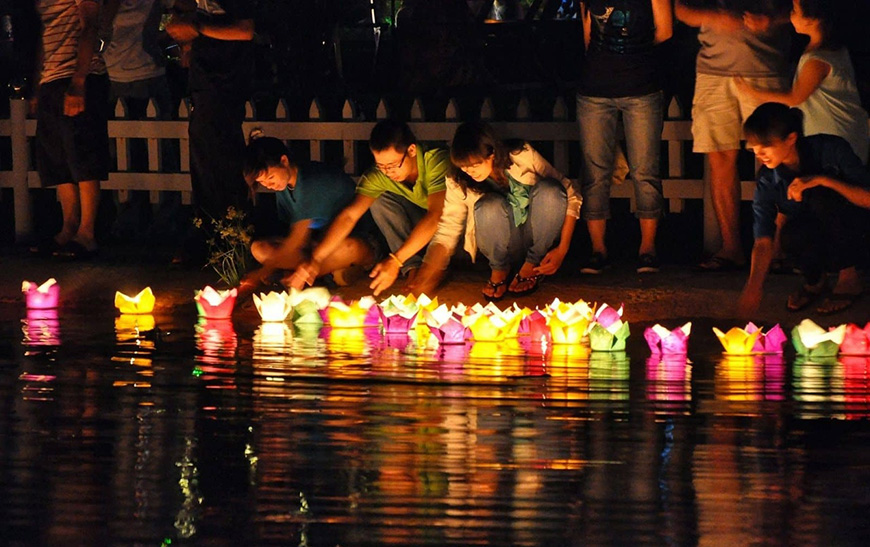
Tet Nguyen Tieu, celebrate the full moon day of the first lunar month - Photo : Internet
1.Tet Nguyen Tieu or Thuong Nguyen ceremony
The origins
The Tet Nguyen Tieu festival, also known as the Thuong Nguyen ceremony, is traditionally celebrated in several Asian countries, mostly in Vietnam and China. Closely linked to the rural practices of Vietnamese farmers for thousands of years, it marks the first full moon of the lunar new year. Despite its Chinese origins, Têt Nguyen Tieu in Vietnam has its own distinctive culture, while sharing and celebrating the return of spring. It is also the symbol of family reunions for those who could not celebrate Lunar New Year’s Eve with their loved ones.
The Tet Nguyen today
Today, the Tet Nguyen Tieu festival is celebrated with lanterns in pagodas and in the streets. Many parts of the country with palanches have revived the custom of the lantern festival. In addition, in Hoi An or in the Chinese community of Cho Lon, in Ho Chi Minh City, activities dedicated to this occasion are organized. After the ceremony, festival participants will let the lanterns slide to the surface of a body of water. The festival is also an opportunity to taste dishes prepared especially for the occasion, before dismantling all the decorations of the Lunar New Year and ending the festive atmosphere to turn to a new year of work.
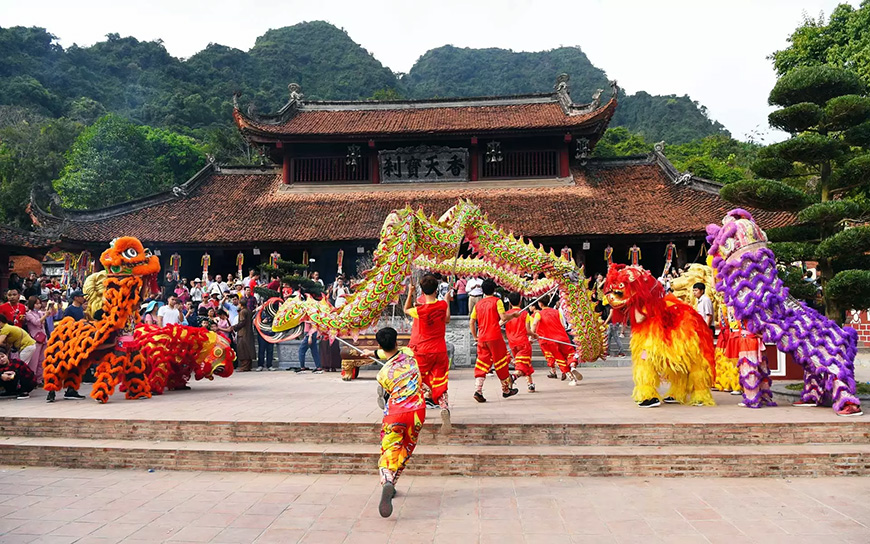
Perfume Pagoda Festival, one of the most sacred celebration in Vietnam - Photo : Internet
2.Festival of the Perfume Pagoda
The origins
The Perfume Pagoda, located in the suburbs of Hanoi, has long been considered a leading sacred destination in Vietnam. It is a huge complex of pagodas, temples and juche shrines on Huong Son Mountain. It is believed that the first temple was a small structure on the present site of Thien Tru that existed under the reign of Thanh Tong in the 15th century. But it is a stele rising in the enclosure of the current temple that dates its construction in the second half of the 17th century. Both enchanting landscape and sacred destination, Chua Huong is a privileged place where Hanoians (but also the inhabitants of other northern provinces) come to spend a weekend away from the noise and excitement of the capital.
The festival of the pagoda of perfumes nowadays
Each year, the Perfume Pagoda Festival runs from the 6th day of the first lunar month until the 6th day of the third lunar month, making it the longest celebration in North Vietnam. Note that the main festival takes place from the 15th to the 20th of the second lunar month. Pilgrims as visitors come to the Perfume Pagoda to make wishes of happiness, prosperity and health. Throughout the period, religious ceremonies alternate with dragon dances, making the happiness of adults and children alike. The latter are delighted to come here by boat on the Yen River, while others will take the cable car and its panoramic view of the surrounding mountain landscape.
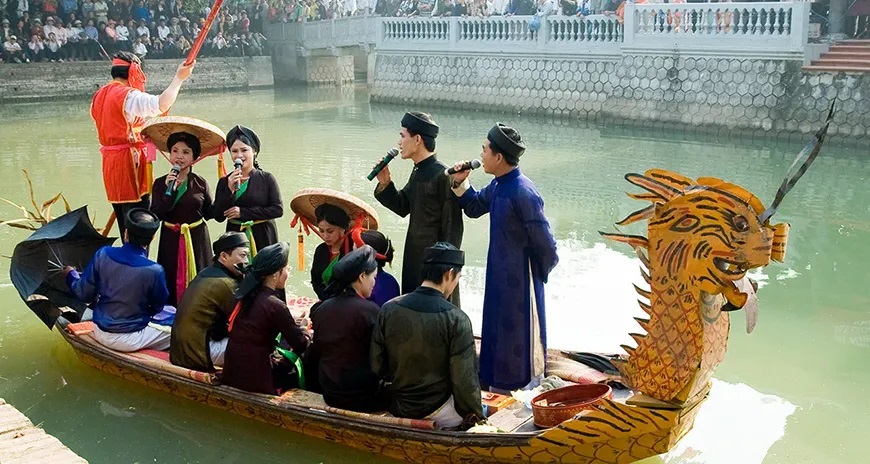
Lim Festival, one of the mos important festival in Vietnam - Photo : Internet
3.Lim Festival
The origins
The Lim Festival takes place every year around the 12th - 13th day of the first lunar month in the city of Bac Ninh, north of the Dragon Country. It is a great Vietnamese cultural celebration, marked by colorful costumes and especially by a distinctive art called Quan ho, a special form of folk singing recognized by UNESCO. This festival, one of the most impressive in the North of the country, takes its name from the Lim pagoda, where it takes place. This is where the memory of Mr. Hieu Trung Hau, considered the inventor of Quan Ho, is honoured.
The festival of Lim nowadays
Nowadays, the festival is a huge celebration of Vietnamese ethnic culture, which lasts 3 days, in an abundance of colorful costumes and artistic performances, while of course passing through the Quan Ho. Every year, the festival attracts visitors from all over the country to Bac Ninh, considered the heart of the cultural region of Kinh Bac, which today extends over several provinces, including even parts of Hanoi.
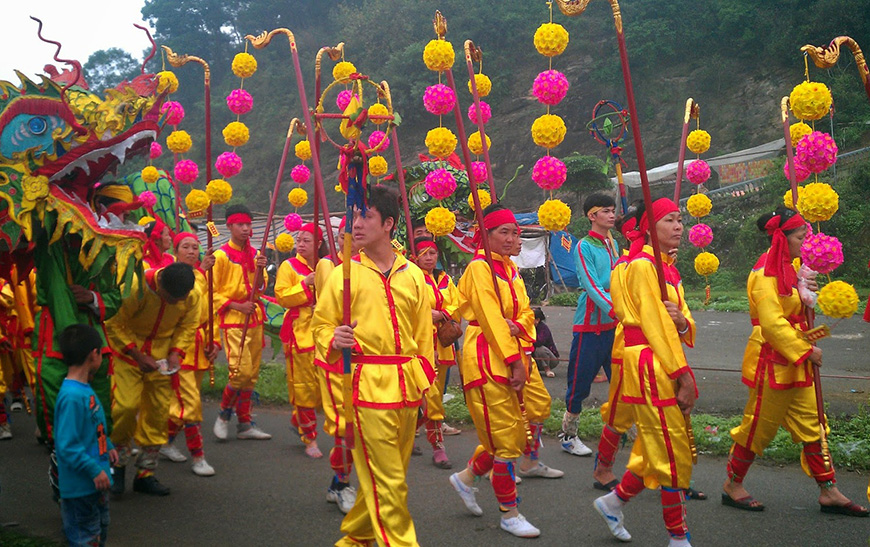
Phu Giay Festival, in honour of the Holy Mother- Photo : Internet
4.Phu Giay Festival
The origins
The Phu Giay Festival is a major celebration that takes place every year from the 1st to the 10th day of the third lunar month in the commune of Kim Thai, Vu Ban district, Nam Dinh province. The festival is dedicated to Lieu Hanh, one of Vietnam’s "four immortal deities". Also known as Princess Quynh Hoa, the daughter of the Jade Emperor, Lieu Hanh had to descend to earth because she broke a gem cup. It seems however that this divinity is based on the existence of a true princess of the 16th century, who died in her youth. The «Homeland» of the Four Immortals is known as Phu Giay, hence the name of the festival. Just as prosaically, the 3rd lunar month being relatively quiet regarding agricultural work, so the organization of festival is facilitated.
Today’s Phu Giay Festival
Today, the Phu Giay Festival attracts many visitors from Lang Son, Hai Phong, Mong Cai, Thai Binh and Ha Noi. The highlight of the festival is the procession organized in honor of the deity, on the 5th day of the 3rd lunar month. It is composed of women and goes from Mount Goi to the two temples (phu) dedicated to the Holy Mother. The festival is also an opportunity to participate in several traditional and folk activities, such as wrestling, cockfighting, lion dragon dance and especially the game "keo chu" (a rope shooting game), but also to attend shows of Vietnamese folk and classical songs, in a festive and family atmosphere.
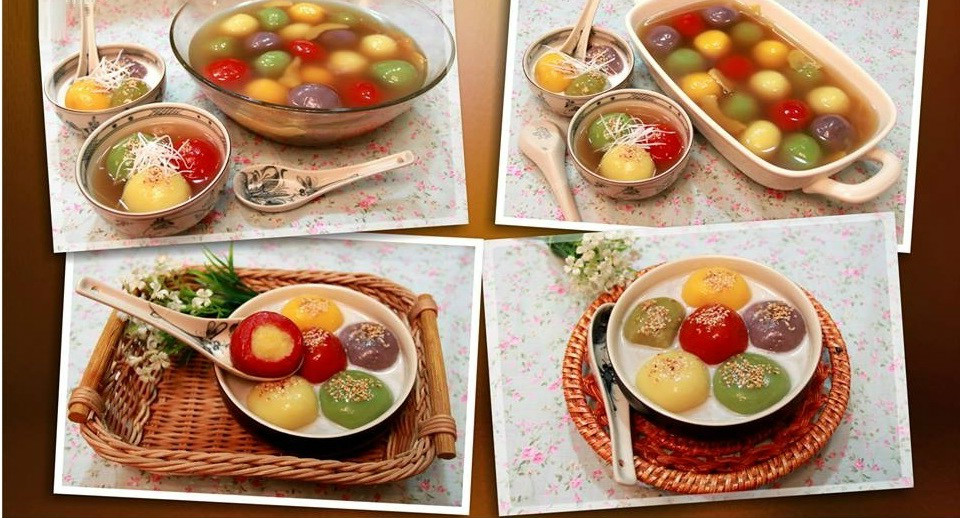
Tet Nguyen Tieu, an old chinese tradition - Photo : media vietq
5.Han Thuc Festival
The origins
The Han Thuc Festival, also known as the Cold Food Festival, is a tradition that dates back to time immemorial. It commemorates a historical allusion in Chinese culture. Often ignored by Vietnamese families, the Han Thuc festival is commonly associated with ancestor worship in late spring.
For the Middle Kingdom, the central character of this tradition is a Mandarin philosopher named Gioi Tu Thoi, reputed to have made an exemplary sacrifice to support the king of the principality Tan during his exile. But back on the throne, this clumsy king would have forgotten to reward our man. Feeling disavowed, Gioi Tu Thoi decides to exile himself in the forest with his mother. Belatedly aware of his ingratitude, the king invited him again to court. Offended, Gioi Tu Thoi refused, which put the king in a rage, to the point of ordering that the forest be burned to flush out the faithful but nevertheless vexed Mandarin and his mother. The latter preferred to perish by fire than to yield to this ungrateful king.
Han Thuc Festival today
It is from this brutal but meaningful act that the custom of eating cold was born. This is also why we refrain from lighting a fire in order not to revive the good souls of those who perished by fire like Gioi Tu Thoi.
Today, the Vietnamese celebrate the Tet han thuc or the Tet of cold food on the 3rd day of the 3rd lunar month. That day, the whole family feasts on two kinds of sweet rice cakes in the shape of meatballs. They will previously be presented with fresh fruit on the altar of the ancestors as offerings.
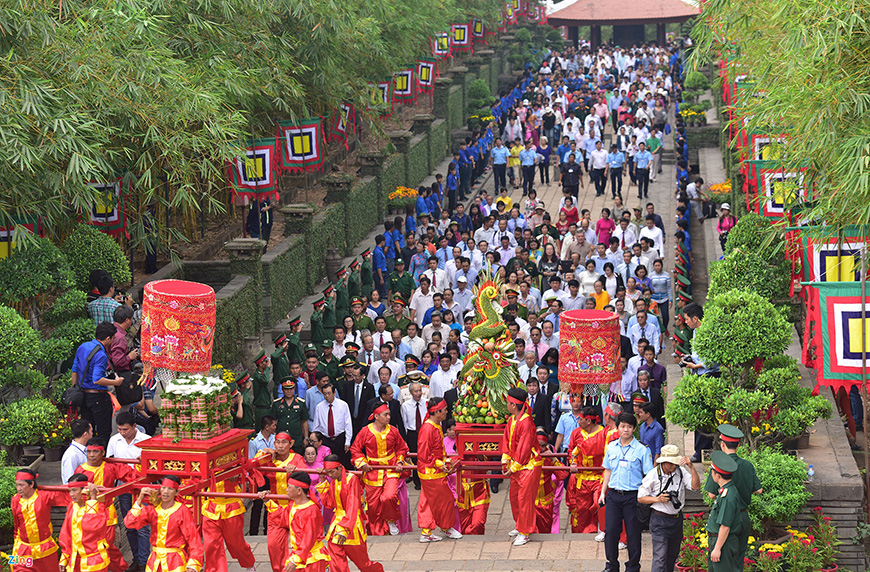
Hung Vuong Festival, "when you drink water, remember its source" - Photo : Internet
6.Hung Kings Festival
The origins
The Hung Kings Festival is a major celebration that takes place every year on the tenth day of the third lunar month. The Vietnamese are heading to the sacred mountain of Nghia Linh in Phu Tho province, to honor the memory of the Hung kings, the Founding Fathers of the kingdom of Van Lang, ancestor of present-day Vietnam.
According to legend, the first king Hung was the eldest son of Lac Long Quan, lord of dragons and Au Co, fairy-queen of the mountains. She gave birth to 100 eggs – 100 sons. Fifty boys followed their father to the sea while the other fifty stayed with their mother in the mountains. The eldest son remained with Au Co founded the kingdom of Van Lang (former Vietnam). He ruled the country as King Hung, which was also the surname used by his 17 successors. The country was therefore ruled by 18 kings in a period from 2 879 to 258 BC.
Hung Kings' worship somehow crystallizes national identity and people’s respect for their ancestors, maintaining an emotional bond between families, villages and the nation. A practice that is found in the popular adage: «When we drink water, we think of its source».
The Festival of Hung Kings Nowadays
Today, the Hung Kings Festival remains one of the most important festivals in Vietnam. The festival takes place every year from the 8th to the 11th day of the third lunar month, the feast day being the 10th day. The festival is usually divided into two highlights: the ceremony itself and the cultural activities. After the ceremony, cultural activities are organized at the foot of the mountain with the participation of the villagers, with in particular canoe races, folk songs and traditional games.
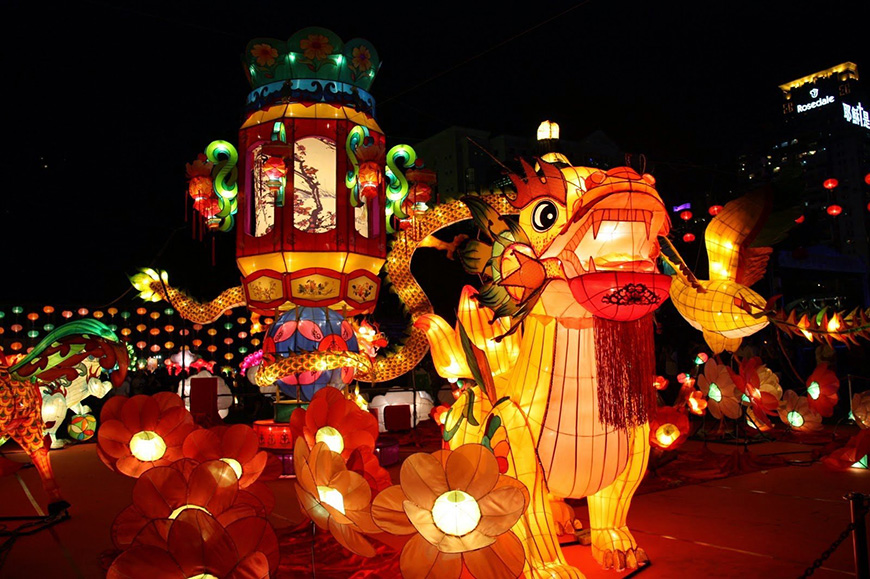
Tet Trung Thu, a kid festival - Photo : Internet
7.Mid-Autumn Festival
The origins
The Mid-Autumn Festival, also known as the Moon Festival, dates back more than 3,000 years to the time of the Shang Dynasty. The ancient Chinese emperors worshipped the moon in autumn because they believed that the full moon would bring them a good harvest for the coming year. The term «mid-autumn» was born under the Zhou dynasty. This custom of celebrating harvests gained prominence from the Tang, where rituals were held on this occasion in the Imperial Palace. Legend has it that Emperor Tang Xuanzong visited the lunar palace of the goddess Chang'e in a dream. Originally in Vietnam, this festival also celebrated rice harvesting.
Today’s Mid-Autumn Festival
Today, the Mid-Autumn Festival is celebrated on the 15th day of the 8th month of the lunar calendar. It is one of the four big traditional festivals and is celebrated throughout the country. People gather to admire and worship the moon as a family. They burn incense, make offerings to the moon, enjoy the special cake while sipping tea, not forgetting to show their affection and best wishes for the members (present and absent) of their family and friends.
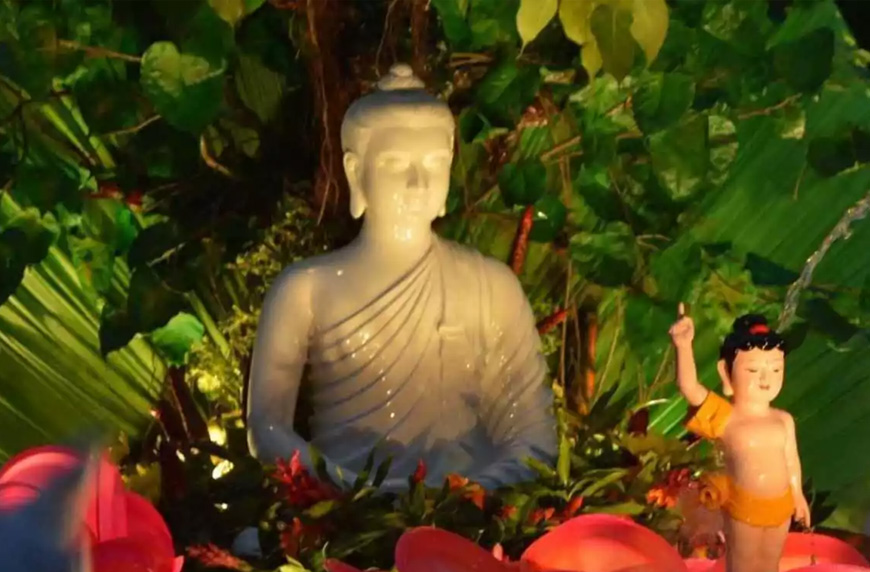
Vesak Festival, celebrating Buddha anniversary- Photo : Internet
8.Birthday of the Buddha (Vesak) in Vietnam
The origins
Called Phat Dan in Vietnamese, the Vesak Festival, also known as the Buddha’s Birthday, is a religious celebration that dates back more than 3,000 years. It commemorates the birth, enlightenment and death of the Gautama Buddha. This festival takes place every year on April 15 of the lunar calendar.
This particular period in the calendar is an opportunity for Buddhists to reflect on the teachings of the Buddha, in his wish to lead humanity towards peace, tranquility and happiness. The lotus flower - symbol of purity and serenity as it rises through the troubled waters of the ponds to flourish with a beauty reminiscent of enlightenment - plays an important role in this celebration.
The Vesak Festival nowadays
Today, the Vesak Festival is enthusiastically celebrated in Vietnam. The monks give speeches and make calls to prayer. Throughout the country, Buddhists give alms, participate in charity actions, volunteer or decorate temples or even recreate scenes from the life of Buddha. This is a time of vegetarian eating. For the visitor, Vesak in Vietnam is a great opportunity to experience Vietnam’s religious culture.